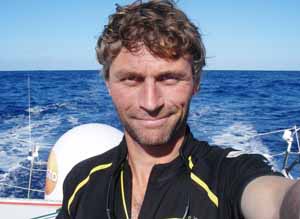What to make of the news that Bernard Stamm is out for trying to keep his boat safe?
What on earth do you make of the startling news today that Bernard Stamm has been disqualified from the Vendée Globe for receiving help when his anchor was dragging at his repair stop in Auckland Island? It’s a decision that follows the letter of the rules of this race, but feels incredibly harsh.
Fearing for your safety and that of your boat, would you have done anything differently?
Yet the rules are absolutely clear. No assistance is allowed. So the race committee’s decision feels, bizarrely, both fair and very unfair.
Part of me thinks the statement that a crewman from the ship crew came on board uninvited and began pulling up the anchor unseen by Stamm is odd. Can you imagine that happening on your boat, never mind one so complicated at the front end as these, with a bowsprit and bobstay to contend with?
Yet when things have to be done in a hurry and there’s a situation to save, who’s to judge?
The disqualification feels incredibly harsh when you put it in
context of what happened to Stamm during the last Vendée Globe in 2009,
when his boat was driven ashore and severely damaged in the Kerguelen
Islands.
He had sought shelter there to make repairs after the
failure of rudder bearings. The wind was so strong he wasn’t able to
motor on to a mooring and somehow was driven ashore – any skipper’s
nightmare scenario. It must have appeared horribly like history
repeating itself.
Here’s a photo taken by Thibault Veroz of
Stamm’s previous boat in the Kerguelens in 2008 that vividly illustrates
the fate Stamm must have seen flash before him.

What I wonder is exactly how small an act of assistance it would take to risk being thrown out of the race? Even if no-one had helped Stamm weigh anchor, presumably someone on board made fast the line from Stamm’s boat. Does that count as well?
The principle of no assistance is what makes the Vendée Globe the ultimate round the world race. But these small acts for the safety of a vessel, which make no advantage for a skipper, are a real conundrum and maybe should weighed up again.
Set that beside the oddity that the rules allow any amount of technical information, photos, diagrams and documentation to be sent to skippers about how to make repairs. Sometimes they are talked through stage by stage by their shore teams. That’s not as much, or more, a form of assistance?
Stamm will probably appeal, and good luck to him. If he doesn’t win, I hope he’ll carry on racing, overhaul some of those in front, and be treated to a hero’s welcome and a moral victory in Les Sables d’Olonne.
On the judgement of the race committee, I’d agree wholeheartedly with Mike Golding, who said today:
“While the decision might technically be correct, it doesn’t feel right. Bernard, perhaps more than others, has worked extremely hard to get to this Vendée Globe and is a great competitor.
“The Vendée Globe is the pinnacle of offshore racing, solo and without assistance. To preserve the fundamental ethos of the Vendée Globe we have to live by the sword and die by the sword. Part of the lure of the race is that it is without assistance and so places the ultimate premium on self-reliance.
“I think I can see the thinking behind the decision. The rules are the rules and all that. But I think when you know all the story about Bernard and you know the situation he is in now, facing a good chunk of South Pacific to sail across and then icebergs at Cape Horn and the problems he still has, I think it just doesn’t feel right. It doesn’t feel like the right thing.
“I am very, very sad for Bernard and I hope he can get an appeal together and stay in the race.”




